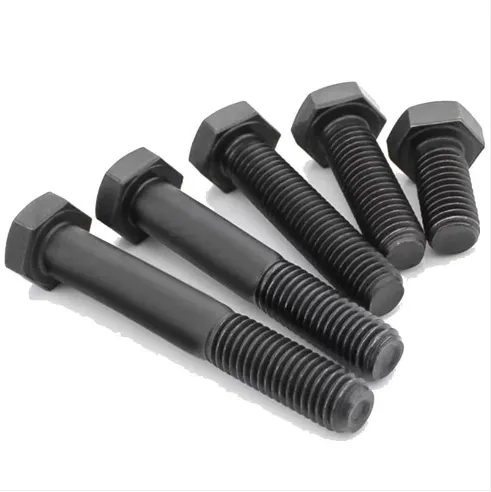black stud bolt factories
Dec . 29, 2024 18:36 Back to list
black stud bolt factories
The Rise of Black Stud Bolt Factories Innovations and Trends
In the industrial sector, the role of fasteners, such as bolts, cannot be overstated. Among these, black stud bolts are gaining prominence due to their versatility, durability, and aesthetic appeal in various applications. Understanding the emergence of black stud bolt factories sheds light on both the manufacturing process and the innovative trends impacting the construction and manufacturing industries.
What are Black Stud Bolts?
Black stud bolts are heavy-duty fasteners used primarily in construction, machinery, and automotive industries. They are characterized by their strength and resistance to high temperatures and corrosive environments. The black finish usually refers to a surface treatment involving an oil coating that provides rust inhibition and a non-reflective surface, making these bolts suitable for diverse applications, from structural components to marine use.
The Manufacturing Process
The production of black stud bolts involves several crucial stages. First, high-quality raw materials, primarily carbon steel, are selected for forging. The steel is heated and shaped into bolts using advanced forging techniques. After shaping, the bolts undergo a heat treatment process to enhance tensile strength and durability.
Once the bolts are forged and heat-treated, they are subjected to a blackening process. This often includes chemical treatments or thermal process applications that not only impart the desired color but also enhance corrosion resistance. Finally, stringent quality control procedures ensure that each bolt meets industry standards for strength and performance.
The Importance of Sustainability
In recent years, the demand for sustainable manufacturing practices has surged, prompting many black stud bolt factories to adopt environmentally friendly processes. By utilizing recycled materials and optimizing energy consumption during production, these factories are not only lowering their carbon footprint but also appealing to a growing market of environmentally conscious consumers.
Additionally, several manufacturers are investing in research and development to innovate new, sustainable materials that can replace traditional steel. For instance, composite materials and advanced alloys are being explored for their potential benefits – including reduced weight and improved corrosion resistance.
black stud bolt factories

Innovations in Design and Application
The black stud bolt industry is experiencing a wave of innovation, particularly in terms of design and application. Manufacturers are increasingly developing custom-sized bolts to meet specific project requirements, thereby promoting efficiency and reducing waste. Advanced CAD (Computer-Aided Design) technologies are employed to optimize bolt designs, ensuring they meet stringent safety standards while enhancing performance.
Moreover, the application of black stud bolts has expanded beyond traditional uses. They are now being utilized in high-tech fields such as aerospace, renewable energy, and automotive manufacturing. As industries evolve and new technologies emerge, the adaptability of black stud bolts makes them an ideal choice for a wide array of applications.
Market Trends and Future Outlook
The global market for black stud bolts is poised for growth, driven by rising industrial activity and infrastructural development. Emerging markets, particularly in Asia-Pacific and Latin America, are expected to experience a significant uptick in demand as economies expand and move towards modernization.
Additionally, the increase in construction projects, particularly those emphasizing high-strength materials, is contributing to this trend. Infrastructure initiatives, such as the development of bridges, highways, and commercial buildings, necessitate reliable fasteners like black stud bolts that can withstand the test of time.
Furthermore, digitalization is also making inroads in fastener manufacturing. Automated production lines and quality inspection processes utilizing AI technology are poised to enhance efficiency and reduce human error in the production of black stud bolts.
Conclusion
As the manufacturing landscape continues to adapt to the demands of modern industries, black stud bolt factories are at the forefront of innovation and sustainability. With their resilient and versatile applications, these fasteners are not just essential components but also symbolize the growth and evolution of industrial practices. As the market expands, it will be fascinating to observe the continued advancements in technology and manufacturing processes that will define the future of black stud bolts.
Latest news
-
Premium Cabinet Bolts Supplier | Wholesale & Custom Solutions
NewsAug.24,2025
-
Reliable Axle Nuts Supplier | Quality & Precision Fasteners
NewsAug.23,2025
-
Durable Bolts for Lawn Mower Handle - Top Supplier & Manufacturer
NewsAug.22,2025
-
High-Quality Bolts for Lawn Mower Handle Supplier & Manufacturer
NewsAug.21,2025
-
Reliable Axle Nuts Supplier | High-Quality Automotive Parts
NewsAug.19,2025
-
Premium Wire Bolts Suppliers | Durable & Reliable Fasteners
NewsAug.18,2025
